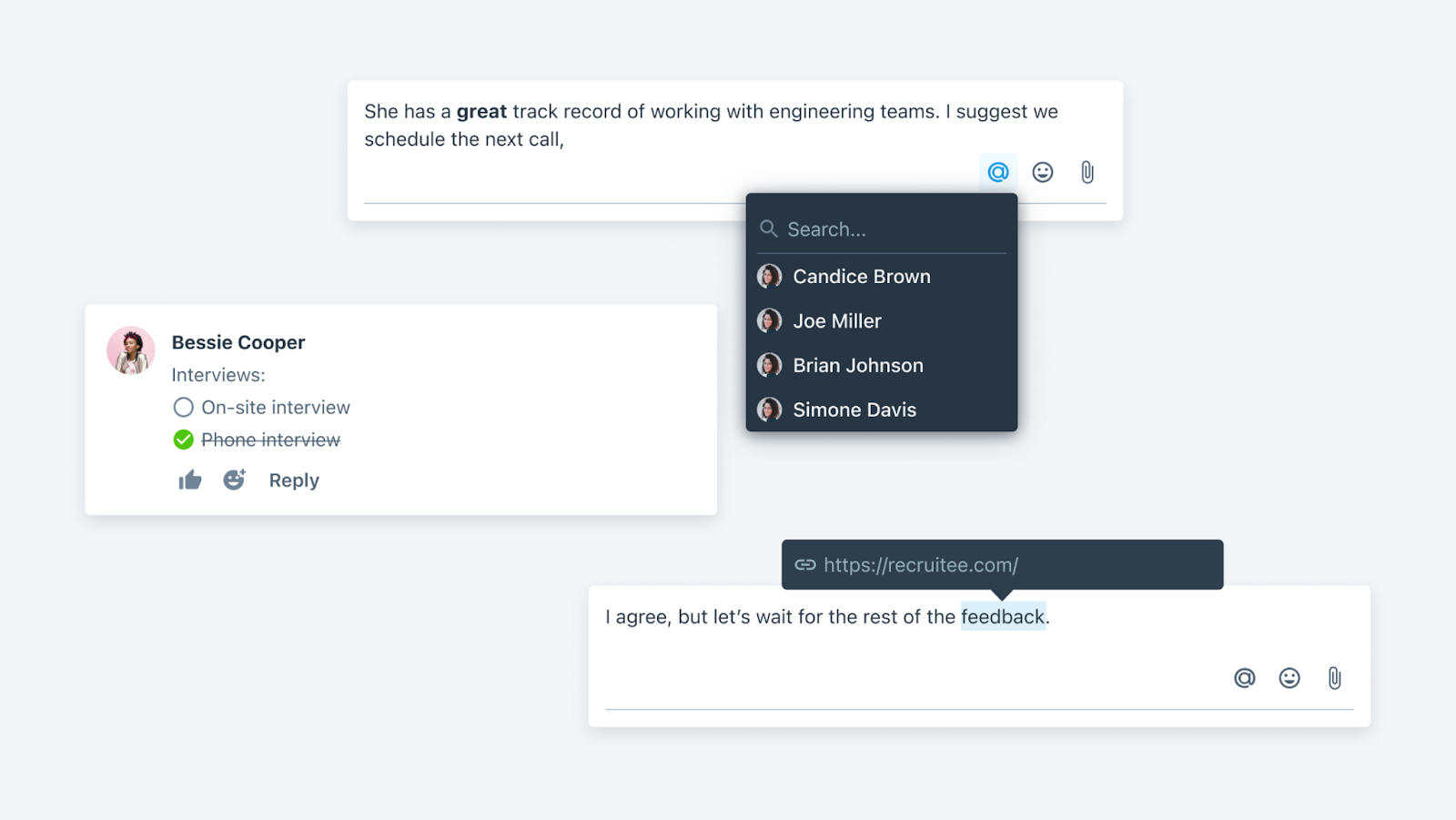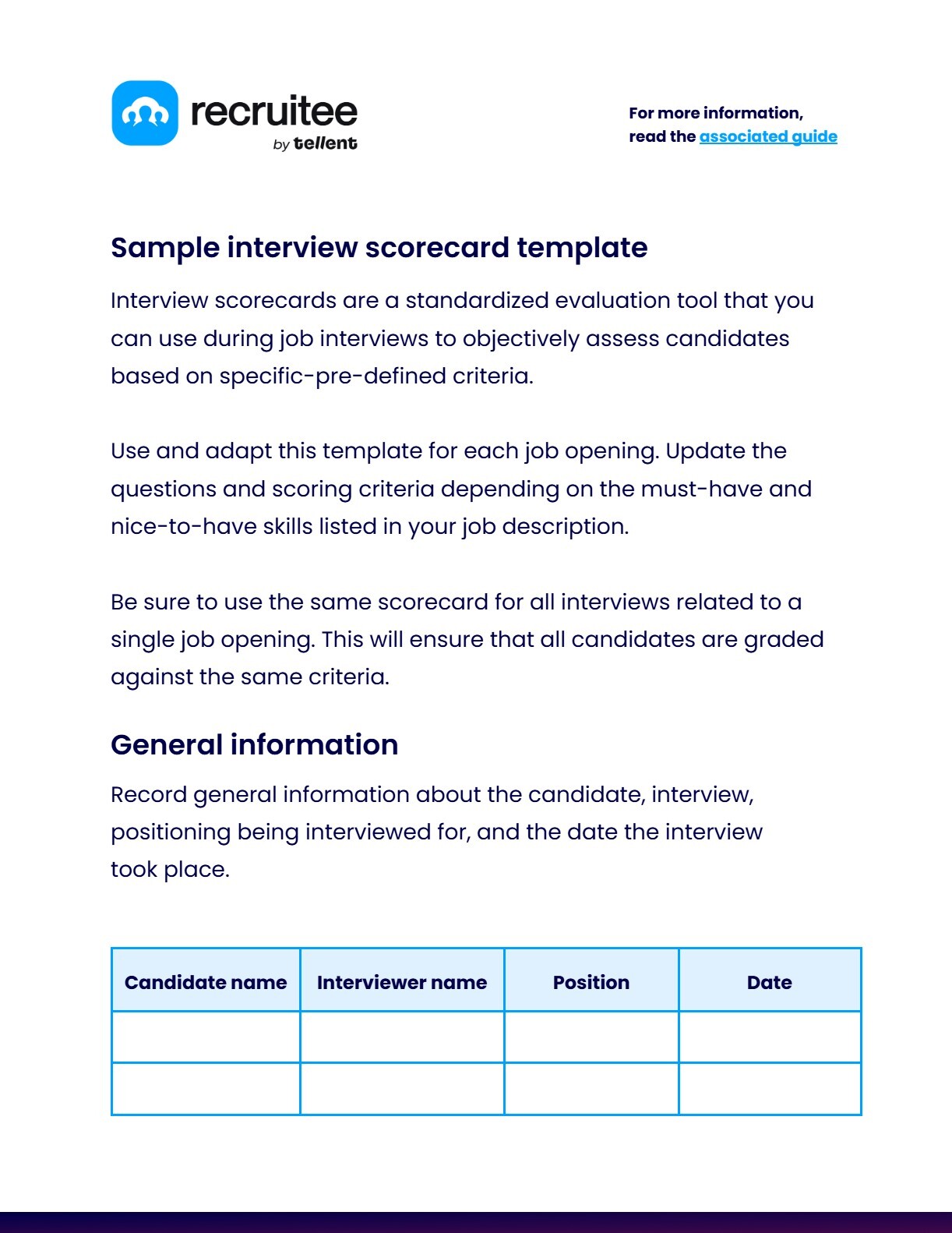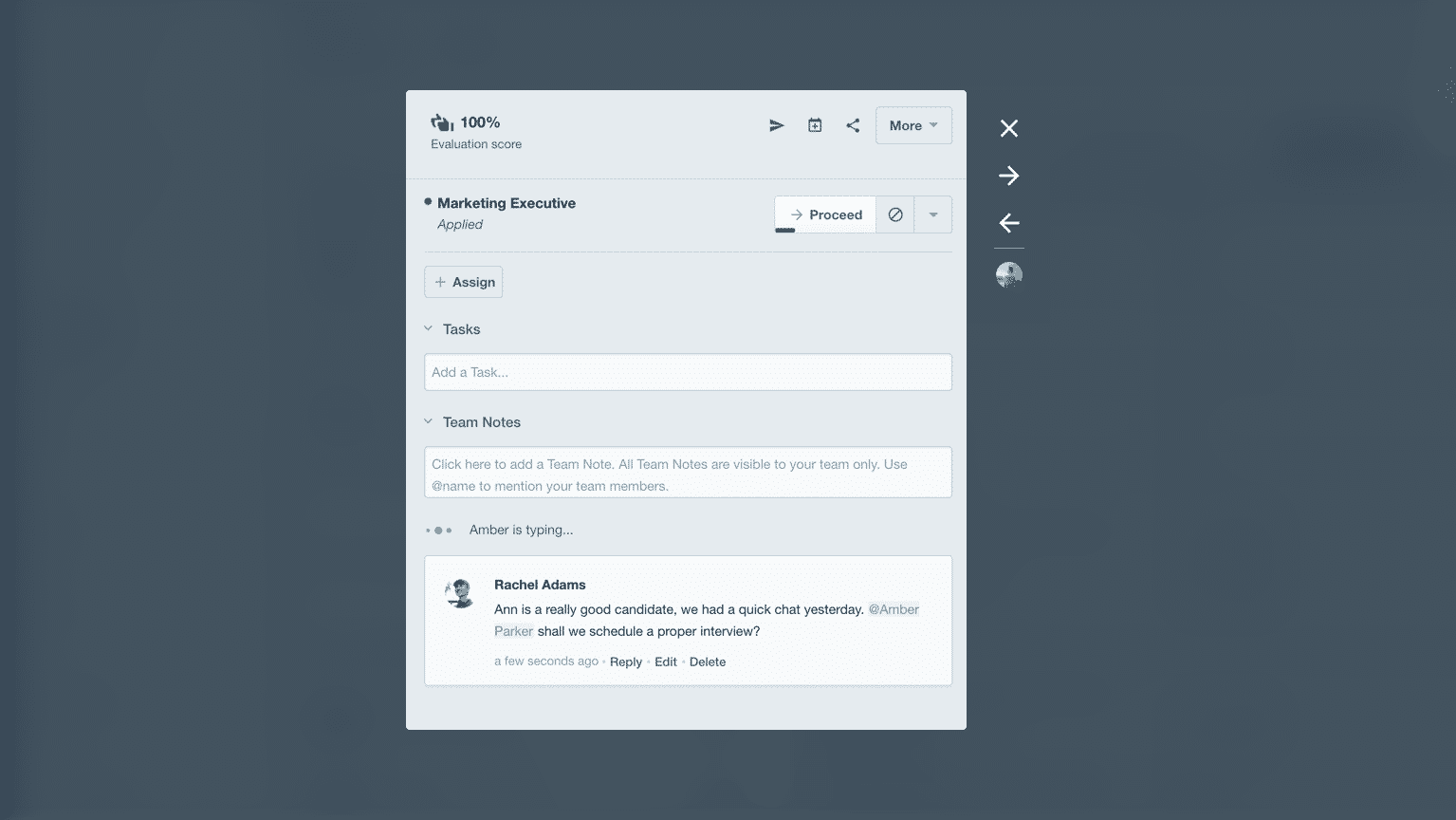Many recruiters and hiring managers prefer to conduct unstructured interviews. In an unstructured interview, there’s no predefined format or interview scorecard, and the intention is to give candidates greater flexibility to respond spontaneously.
In an ideal world, unstructured interviews would be the perfect solution for tough hiring decisions. They give interviews maximum leeway over how they interact with candidates and learn information about them. But unfortunately, hiring managers work in a world of strict labor legislation, candidates who are not always candid, and constant pressure to fill vacancies. In this world, unstructured interviews are risky.
This combination of realities is fertile ground for poor hiring decisions. To avoid poor hiring decisions, hiring teams often turn to a structured interview process to ensure a standardized and scalable experience. At the heart of these processes are interview scorecards.
This article will introduce the concept of interview scorecards, and explore how you can use them in your structured interview process.
What is an interview scorecard?
An interview scorecard is a standardized evaluation tool used during job interviews to objectively assess candidates based on specific, pre-defined criteria.
Typically part of a structured interview, scorecards allow interviewers to rate each candidate on key competencies—such as technical skills, cultural fit, and problem-solving abilities—using a consistent rating scale. By focusing on these pre-defined criteria, interview scorecards ensure that all candidates are measured equally, reducing bias and improving hiring accuracy.
Used effectively, these scorecards can enhance fairness, reduce subjectivity, and lead to better hiring outcomes overall.
The purpose of interview scorecards
The purpose of a scorecard is to question candidates on specific requirements that are essential to the job that they’re being interviewed for and evaluate their responses.
Specifically, interview scorecards are designed to:
- Align interview questions with job requirements. Interview scorecards ensure that candidates are evaluated on criteria specific to the role, drawing directly from the job description for relevant and targeted questions.
- Standardize candidate evaluations. By using a scorecard, interviewers can objectively rate each candidate on the same set of requirements, creating a consistent, fair, and structured interview process.
- Improve decision-making accuracy. Scorecards offer a clear comparison of candidates’ responses, helping hiring teams make data-driven hiring decisions by evaluating candidates side by side.
- Reduce hiring bias: Structured scorecards minimize personal bias, enabling a fairer assessment focused solely on job-relevant competencies and qualifications.
- Streamline the interview process. Scorecards provide interviewers with a structured framework, improving focus during interviews and ensuring no key areas are overlooked.
Of course, to be effective, interview scorecards need to be used properly.
The role of scorecards in structured interviews
In structured interviews, scorecards guide hiring managers through a consistent, objective evaluation process. Here’s how they’re used before, during, and after the structured interview process.
First, the hiring manager collaborates with the recruitment team to identify essential job criteria, such as skills, experience, and cultural fit, based on the job description. These criteria are organized on the scorecard, each with a defined rating scale (for example, 1 to 5), that will be used to assess each candidate against the same standards.
During the interview, the manager uses the scorecard to evaluate responses for each evaluation area, taking notes on specific examples or relevant behaviors. For example, if problem-solving is a key skill, the manager asks candidates a standardized problem-solving question and rates their answers based on clarity, creativity, and effectiveness.
After interviews, the manager reviews all scorecards, comparing ratings and comments across candidates. This structured approach streamlines the decision-making process, reducing bias and ensuring that only the best-fitting candidates advance.
Key components of an interview scoring sheet
Interview scorecards should include the following components to act as an effective evaluation tool during structured interviews:
- Job-specific evaluation criteria. Include core competencies, skills, and qualifications directly relevant to the role, such as specific hard and soft skills.
- Rating scale. A standardized scale, often 1 to 5 or 1 to 10, to consistently rate each candidate’s performance across all criteria.
- Behavioral indicators. Define what success looks like for each evaluation area, providing examples or specific behaviors that signal a strong, average, or poor response. Interviews can use these examples as a basis for their scoring.
- Notes section. Space for interviewers to document specific examples, strengths, or concerns observed during the interview to support their ratings.
- Overall recommendation. A summary section for a “hire” or “no hire” recommendation, often accompanied by a final score or average rating.
- Candidate and interview details. Basic information like candidate name, interviewer(s) name(s), date, and job title to keep records organized.
- Cultural fit assessment. Optional section to evaluate alignment with company values and team dynamics, especially for roles requiring strong cultural integration.
Interview scoring sheets may come in a variety of formats, depending on the tooling you have in place. Many ATS or HRIS platforms offer digital forms that can be used to create interview scorecards for each job opening. Other options include spreadsheets, PDFs, or printable templates that can be used for in-person interviews.
Pros and cons of using interview scorecards
Recruiters and hiring managers may be skeptical of interview scorecards and fear that they will make the process too rigid and impersonal. The reality is that there are pros and cons to using interview scorecards, which must be weighed before you integrate them into your interview process.
Benefits of interview scorecards
Key benefits of interview scorecards include:
- Clarifying job requirements. Interview scorecards allow hiring team members to analyze and fully understand the job criteria before the interviews start.
- Setting realistic hiring expectations. They eliminate unrealistic expectations that can cause jobs to remain open for extended periods, negatively affecting a department’s performance.
- Enabling fair panel assessments. Interview scorecards are excellent tools in panel interviews because each panel member’s observations can lead to a more fair candidate assessment in final group scoring.
- Tracking consistency of responses across interview rounds. When a candidate attends a series of separate interviews, a scorecard can measure the consistency of the candidate’s responses.
- Promoting collaborative hiring. Team collaboration before and after interviews means that scorecards encourage collaborative hiring.
- Reducing personal bias. Interview scorecards can eliminate personal bias during interviews, and post-interview, team members can identify if anyone unknowingly harbors personal prejudices.
- Keeping interviews focused and consistent. Due to interview scorecards, interviewers can stay focused on the job requirements only, leading to consistent interviews and ethical decision-making.
- Standardizing assessments for large teams. If you have large teams with specific skill requirements, you can standardize and use the same scorecard repeatedly throughout your company.
- Supporting training and upskilling. If the compilation of a scorecard results in consistently high-quality hires, you can use it to train and upskill existing staff.
- Making it easier to remember each candidate. When you’re interviewing, a scorecard helps you remember each person, eliminating the mental blur recruiters can experience when they see too many candidates.
While the benefits of interview scorecards are many, they aren’t without their challenges and drawbacks. Let’s explore some of those now.
Negatives of interview scorecards
Key drawbacks of using interview scorecards include:
- Limiting natural conversation. The structured nature of scorecards may restrict the flow of conversation, making it challenging for interviewers to connect with candidates and explore unexpected insights.
- May stifle spontaneity and candidness. Rigid adherence to scorecards can make interviews feel overly formal, potentially preventing candidates from showcasing their full personality or creativity.
- Increasing preparation time. Creating detailed and job-specific scorecards requires upfront time and effort from hiring teams, which can be a drawback for organizations with limited resources.
- Can create a false sense of objectivity. While scorecards aim to reduce bias, their effectiveness still depends on the consistency of each interviewer’s scoring approach, which may vary. This can create the illusion of full objectivity where it may not actually exist.
- Requires thorough training for interviewers. Without proper training, interviewers may not fully understand how to use scorecards effectively, leading to inconsistent ratings and possible misinterpretations.
- May lead recruiters to overlook job-specific requirements. Using the same scorecard template across different roles or departments can lead to genetic evaluations that don’t address the unique needs of each position. This is why it’s so important to create new scorecards for each job opening that are closely connected with job requirements and ideal candidate personas.
- Risk of overemphasis on scoring over qualitative insights. Heavy reliance on scorecard scores can cause interviewers to focus too much on numbers, potentially overshadowing valuable qualitative feedback.
How to create and use an interview scorecard
To avoid these drawbacks—and reap the benefits highlighted above—recruiters must understand how to effectively use interview scorecards. Here’s how.
1. Crystalize the job criteria before interviews begin
To use an interview scorecard effectively, start by crystallizing the job requirements and aligning the scorecard with these specific criteria.
Collaborate with hiring managers to identify essential skills, competencies, and values the candidate must demonstrate. This helps ensure that the questions and scoring criteria are highly relevant and directly tied to the role. By doing this, interviewers stay focused on essential qualifications and avoid assessing candidates based on irrelevant criteria. This helps to set a clear standard that every candidate must meet.
2. Be consistent with your interview structure
An interview scorecard promotes a structured interview, which helps reduce bias and keeps the conversation on track. Begin by asking each candidate the same questions for each area of assessment, using the scorecard to evaluate their responses objectively.
A structured approach prevents interviewers from going off-script or favoring candidates based on personal biases. However, it’s essential to stay open to candidates’ unique insights. While the scorecard provides structure, allowing for follow-up questions when needed can bring out valuable details without sacrificing consistency.
3. Stay flexible and engage with the candidate
Despite the scorecard’s structured approach, effective interviewers strike a balance by keeping the interview conversational.
An interview that’s too rigid can make the interaction feel formal or impersonal, which may stop candidates from fully expressing themselves. To address this, interviewers should use the scorecard as a guide rather than a strict script. Let candidates expand on their answers and encourage open-ended responses. This flexibility can help interviewers gauge interpersonal and cultural fit, adding depth to the structured assessment.
4. Use notes and record observations to give depth to evaluations
One of the most valuable parts of a scorecard is the notes section, where interviewers can document specific examples, strengths, or concerns. Taking notes during the interview allows interviewers to capture insights beyond the score, which becomes especially useful during final evaluations and panel discussions.
Remember, the goal is not just to assign a score but to build a comprehensive picture of each candidate’s qualifications. Detailed notes also make it easier to recall individual candidates and maintain consistency in evaluations when comparing multiple candidates.
Tip: Recruitee by Tellent allows hiring team members to write and record team notes for each individual candidate tied to a specific job opening. This allows interviewers to quickly add feedback and thoughts about candidates in a centralized location to help facilitate future hiring decisions.

5. Review results and share notes with your hiring team
After interviews, hiring team members should review scorecards as a group.
Collaborative review sessions encourage all interviewers to share their perspectives, compare notes, and come to a consensus that’s relatively free from bias. Effective use of interview scorecards involves not only accurate scoring but also open team discussions to decide on the most suitable hire, blending objectivity with insights to support better hiring outcomes.
Tip: Even with interview scorecards, bias can creep into the evaluation process during group discussions. More junior employees may change or water down their opinions about certain candidates if they hear a more senior teammate share their insights first. Recruitee by Tellent offers a Fair Evaluations tool that hides feedback from other team members until after an interview submits theirs. This ensures that all hiring team members are able to give an honest and uninfluenced view of each candidate, helping to form a more balanced perspective.
Sample interview scorecard template
To help you get started, here’s a simple interview scorecard template with the best practices listed above. Update and adapt the questions and evaluation criteria as needed for your own structured interviews.
Click on the image below to access the template. Make a copy of the document to edit and use it for your own interview process.

Simplify interview scorecards with Recruitee
Interview scorecards can be compiled manually and shared via email, but that leaves the whole process open to misinterpretation, human error, and even scorecards being ignored. That could mean that despite the best intentions of some hiring team members, poor hiring decisions will still be a reality.
A recruitment platform like Recruitee allows you to select different templates for each vacancy to compile comprehensive job descriptions and scorecards, simplifying the whole process. With all team members tracking and sharing information, misinterpretation, and human error are eliminated. Team member’s notes are immediately available to the hiring team, and candidate scores are easily accessible.

This makes hiring decisions based on fair and transparent interview processes a reality, and all records are maintained and stored for future use if necessary. Another advantage of using an ATS is that if the company is accused of unfair hiring practices or biases, records taken from the ATS will be admissible as evidence in the company’s defense.
Want to test this process and tooling for yourself? Try Recruitee free for 18 days to discover how to improve your hiring with structured interviews.








